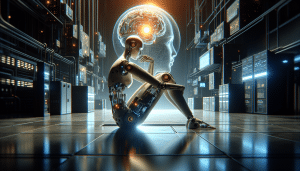Artificial Intelligence Unraveled for Everyday Life
Aiden Foster September 27, 2025
Explore how artificial intelligence integrates into daily routines, reveals new opportunities, and reshapes the tech landscape. This guide demystifies AI, explains practical tools, and highlights what everyone should know as this powerful technology becomes more accessible and essential.
Understanding Artificial Intelligence and Its Core Concepts
Artificial intelligence (AI) represents a fascinating blend of computer science and cognitive theory. It enables machines to perform tasks that usually require human intelligence—such as learning, reasoning, and problem solving. Machine learning, deep learning, and natural language processing form the foundation of modern AI. These powerful tools allow computers to identify patterns in vast datasets, adapt to real-world scenarios, and respond intelligently to human input. The beauty of AI lies in its ability to handle complex challenges—think recognizing faces in photos or translating languages on the fly. These capabilities are woven into many tech-driven experiences, sometimes without notice, influencing everything from online search to recommendations on streaming platforms.
AI’s scope is far-reaching. Unlike traditional computer programs that follow strict instructions, AI thrives on adaptability. For example, algorithms can learn from user preferences, improving recommendations or filtering spam emails with growing accuracy. The technology leverages neural networks, modeled after the human brain, to develop more nuanced understanding and decision-making abilities. These systems excel at sifting data, identifying subtle relationships, and providing actionable insights. The intelligence driving voice assistants, chatbots, and even predictive text is based on years of research into neural network architecture and machine learning frameworks, making everyday tech smarter and more responsive.
Understanding key AI concepts like supervised learning, unsupervised learning, and reinforcement learning can unlock new possibilities for personal and professional growth. Supervised learning, for instance, trains models using labeled datasets to solve tasks such as image recognition, while unsupervised techniques find hidden patterns in unlabeled data. Reinforcement learning mimics the trial-and-error approach often used for teaching skills. Each model helps drive innovation in sectors such as healthcare, education, and transportation. Exploring these foundations makes it clearer how practical AI solutions are developed, opening doors for curious minds to follow new tech trends, learn essential skills, or consider new career paths.
Everyday Examples of AI Making Life Easier
Artificial intelligence quietly powers many services used every day. Digital voice assistants, like Siri, Alexa, and Google Assistant, have transformed how people interact with technology. They rely on natural language processing and machine learning algorithms to interpret voice commands, schedule reminders, or answer a wide range of questions. An individual may use an AI-powered assistant to set an alarm, control smart home devices, or even translate foreign phrases while traveling—all without realizing how much artificial intelligence is working behind the scenes. This seamless integration has become a hallmark of intuitive tech.
AI is also making strides in personalized content delivery. Streaming services—including platforms like Netflix and Spotify—use machine learning to analyze viewing or listening behaviors, helping users discover new shows and songs they might enjoy. Recommendation engines work around the clock, sifting through millions of data points to curate unique suggestions for each person. Online shopping platforms adopt similar technology, leveraging artificial intelligence to anticipate needs, offer timely deals, and streamline checkout processes for convenience. Additionally, AI enhances digital security by monitoring for potential fraud, helping keep financial transactions safe with minimal user intervention.
Artificial intelligence is fundamentally transforming transportation as well. Navigation apps such as Google Maps and Waze utilize AI to forecast traffic conditions, recommend alternate routes, and estimate arrival times. Autonomous driving research continues to advance, exploring ways to improve road safety and efficiency. In healthcare, AI-driven platforms can analyze medical images or interpret sensor data from fitness trackers, empowering both professionals and laypersons with deeper health insights. These diverse examples show just how deeply embedded AI has become, often working quietly in the background to enrich daily life.
Machine Learning: Powering Smart Decisions in Modern Technology
Machine learning sits at the heart of artificial intelligence progress. It’s a set of algorithms that allows computers to learn from data, adapt, and make increasingly accurate predictions over time. Machine learning algorithms are designed to analyze massive sets of information—ranging from financial transactions to user preferences—spotting patterns that would be challenging for humans to find. These capabilities have enormous implications across industries. In finance, machine learning helps detect unusual activity to prevent fraud. In healthcare, it assists with early disease detection by sifting through medical records and research data.
One of the notable aspects of machine learning is its flexibility. It supports both predictive analytics and complex decision-making. Companies use it to optimize marketing campaigns, predict customer needs, or manage inventory more efficiently. For individuals, machine learning enhances spam filtering in email platforms and improves the relevance of search engine results. Thanks to supervised and unsupervised learning, algorithms become more precise with increased exposure to data. The impact of this technology continues to grow, making processes smoother and information more reliable in an age overwhelmed by digital content.
Deep learning, a powerful subset of machine learning, draws inspiration from how the human brain works, utilizing artificial neural networks with many layers. This structure allows systems to automatically extract meaningful features from raw data, such as identifying faces or voices. Deep learning powers breakthroughs in areas like language translation, facial recognition, and autonomous driving. These advances depend on sophisticated training and validation techniques, presenting vast new opportunities for the integration of artificial intelligence into consumer products and industrial systems alike. Understanding machine learning is a practical gateway for anyone interested in the expanding tech ecosystem.
AI Ethics and the Importance of Responsible Technology
Ethical considerations are essential in artificial intelligence development and deployment. As AI becomes capable of making decisions that impact people’s lives, new conversations arise around privacy, fairness, and accountability. Bias in data or decision-making processes can have wide-reaching implications—from inaccurate job screening to financial exclusion or misdiagnosis in medical applications. Ensuring transparency in how algorithms function, as well as prioritizing ethical model design, is a key concern for technologists and policymakers alike. By examining AI’s impact on society, stakeholders aim to find ways to mitigate risk while maximizing benefit.
AI governance frameworks have emerged to address questions of responsibility, safety, and transparency. Various countries and organizations are investing in research to help set guidelines for ethical AI implementation. These guidelines recommend fair data usage, robust security protocols, and regular system audits. Openness about how decisions are made is needed to foster trust and encourage widespread adoption. Discussions around AI ethics now involve not just technologists, but also social scientists, ethicists, and community leaders who recognize the importance of inclusive, broad-based deliberations when it comes to setting standards for emerging technology.
Ultimately, the future of artificial intelligence will depend on responsible development. Building explainable AI—systems where decision-making logic can be understood and reviewed—empowers users to trust tech-driven outcomes. Accessibility to education about ethical AI also helps individuals make informed decisions when interacting with digital products in daily life. By learning how AI systems can be designed and governed for public good, people are better equipped to engage in meaningful conversations about their digital futures while contributing to a safer, more transparent tech landscape.
How to Prepare for an AI-Driven Future
As artificial intelligence becomes more central to work and life, upskilling is an increasingly valuable investment. Individuals who learn about AI fundamentals, machine learning, and digital literacy can navigate tech shifts with more confidence. Free and affordable online courses from respected academic institutions and platforms like Coursera, edX, and Grow with Google present structured opportunities for self-education. Many focus on practical applications—teaching how to analyze data, create simple machine learning models, or use AI-powered productivity tools. Taking advantage of these resources fosters adaptability and may open doors to new roles in the workforce.
Staying curious about technology developments ensures an informed perspective as innovations roll out. AI-powered automation in industries like manufacturing, logistics, and financial services prompts shifts in job roles and skill requirements. Individuals who explore the basics of data science, computer programming, or ethical implications of AI stand to benefit the most from these changes. Communities and workplaces increasingly promote digital learning, providing resources and skill-building sessions. This inclusive approach makes it easier for people from diverse backgrounds to engage with tech on their own terms, encouraging lifelong learning in a rapidly evolving environment.
Proactively adopting AI tools for personal productivity—such as smart scheduling assistants, advanced search features, and adaptive educational apps—can deliver daily benefits. Reviewing privacy settings, understanding data-sharing policies, and prioritizing secure technology use all contribute to a more intentional, empowered relationship with AI-driven products. Knowledge about responsible innovation and ethical use of technology isn’t just for specialists; anyone can engage with the issues and opportunities presented by artificial intelligence. Being prepared positions individuals and communities to thrive in a digital future shaped by continuous discovery and growth.
The Road Ahead: Staying Informed and Proactive
Artificial intelligence is projected to accelerate advancements in science, business, and personal productivity. Researchers foresee breakthroughs in medicine, climate modeling, and personalized learning thanks to increasingly sophisticated AI techniques. For businesses, smart automation and data-driven insights drive efficiency, while for individuals, access to innovative tools supports creativity and informed choices. Staying alert to updates and developments in the field means embracing continuous change. Reliable news sources, open-access courses, and global forums provide ample ways to learn, share, and stay involved with AI’s ongoing evolution.
It helps to cultivate a mindset of responsible skepticism. Not all tech solutions are equally beneficial or safe. Critical thinking and awareness of data privacy, security, and ethical implications protect both users and organizations. Communities benefit from open discussion and shared governance around digital innovation. Forums, workshops, and advisory councils support ongoing dialogue between stakeholders. This collaborative spirit ensures artificial intelligence evolves in a direction that serves the wider good, fostering transparency, equity, and accountability at all stages of tech adoption.
AI’s story is still being written. Its influence grows with each breakthrough, challenging assumptions and inspiring new ambitions. Everyone has a stake in understanding and shaping this technology. By cultivating curiosity, focusing on transparency, and pursuing knowledge, individuals can help guide the role of artificial intelligence in tomorrow’s society. Learning, adapting, and collaborating pave the smartest way forward, keeping technology meaningful, helpful, and human-centered as progress marches on.
References
1. Stanford University. (n.d.). Artificial Intelligence: Foundations of Computational Agents. Retrieved from https://ai.stanford.edu/
2. National Institute of Standards and Technology. (2023). AI Risk Management Framework. Retrieved from https://www.nist.gov/itl/ai-risk-management-framework
3. European Commission. (2023). Ethics guidelines for trustworthy AI. Retrieved from https://digital-strategy.ec.europa.eu/en/policies/ethics-guidelines-trustworthy-ai
4. Coursera. (n.d.). AI for Everyone. Retrieved from https://www.coursera.org/learn/ai-for-everyone
5. MIT OpenCourseWare. (n.d.). Introduction to Deep Learning. Retrieved from https://ocw.mit.edu/courses/electrical-engineering-and-computer-science/6-864-advanced-natural-language-processing-fall-2005/index.htm
6. U.S. Department of Energy. (2023). Artificial Intelligence in Everyday Life. Retrieved from https://www.energy.gov/articles/artificial-intelligence-everyday-life








